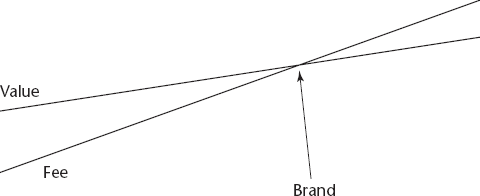Value-Based Fees: How to Charge—and Get—What You're Worth: A Guide for Consultants, Second Edition
by Alan Weiss Ph.D.
11.2. THE PUBLISHING PREROGATIVE
I watch aghast and with awe when someone plays the piano well, because I have tried, can't do it, and think it's a gift.
It turns out that people feel the same way about other people who can write well.
Fees flock to expertise. The dynamic is shown in Figure 11.1.
We tend to believe (as I used to) that fee follows value—in other words, the greater the value, the higher the fee. However, the lines cross if you develop a powerful brand. At that point, people believe they get what they pay for. There is a rewarding ego payback for buying the best, which other people recognize. No one needs a Bulgari watch to tell the time or a Mercedes SL for transportation. People purchase them for lifestyle reasons.
What has this to do with technology? The Internet is the ultimate repository of specific content. There are sites for left-handed fishing gear and nineteenth-century Tibetan history. Though buyers don't troll the Net to find consultants, everyone uses the Net to acquire information from experts.
Figure 11.1. Fees Flock to Value.

Consequently, publishing on the Internet serves the following fee-enhancing purposes:
You can rapidly gain credibility as an expert.
You can create and disseminate unique intellectual property.
You can obtain third-party endorsements for your expertise via columns (the publisher being the third party).
You can respond easily to ...